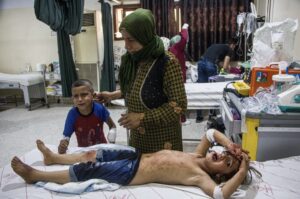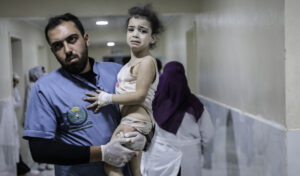Over the past years, an unfathomable number of refugees have embarked on treacherous sea journeys, hoping to find safety and a brighter future. Sadly, too many of these individuals have met a tragic end, their lifeless bodies washing ashore on unfamiliar lands. The stories of these courageous souls have captured international attention, revealing a painful reality that demands urgent action. From the heart-wrenching images that shook the world to subsequent incidents, we must confront the undeniable truth: as a global community, we are failing those seeking refuge.
In April 2015, the world was confronted with a devastating incident. A boat carrying over 800 refugees capsized in the treacherous waters off the coast of Libya. The images that emerged from this catastrophe were indelible—a sea of desperate souls struggling against the waves, their lives slipping away. The tragedy underscored the extreme circumstances driving individuals to risk everything, including their lives, in the search for a glimmer of hope.
The year 2016 witnessed another heart-wrenching event that shook the collective conscience of humanity. In May 2016, a refugee boat carrying over 500 people sank in the vast expanse of the Mediterranean Sea. Families torn apart, dreams shattered, and the loss of innocent lives highlighted the profound impact of a system failing to provide safe alternatives for those in dire need.
The Greek Island of Lesbos, once a beacon of hope for refugees, became the backdrop of a tragic incident in October 2016. As another vessel capsized, the world was reminded of the perils faced by those seeking sanctuary. The shores that were meant to offer respite instead bore witness to the silent suffering of those lost to the relentless waves.
Only months later, in March 2017, tragedy struck again in the Aegean Sea. A refugee vessel overturned near the Greek Island of Rhodes, plunging individuals into the unforgiving depths. With every life lost, the international community confronted the painful truth that urgent action was needed to address the plight of these vulnerable individuals.
The year 2018 brought further anguish as a boat carrying refugees capsized in the Aegean Sea. Amidst the cries for help and the chaos that unfolded, the world’s attention was once again drawn to the high human cost of unsafe migration routes. Lives lost at sea became an all-too-common occurrence, demanding a collective response that prioritized humanity over borders.
The coast of Tunisia witnessed a devastating tragedy in August 2019. A migrant boat sank, claiming the lives of those seeking refuge from unrest and uncertainty. The waters that should have symbolized freedom became a graveyard for aspirations and dreams, underscoring the urgent need for comprehensive and compassionate solutions.
Even as Europe grappled with the ongoing crisis, distressing scenes unfolded in the English Channel in November 2020. Desperate attempts to reach safety resulted in yet another tragedy. The waters that connect nations became a deadly barrier, reminding the world that a humanitarian crisis knows no boundaries.
At the beginning of 2021, the Mediterranean Sea claimed more lives. Overcrowded boats continued to capsize, leaving refugees lost at sea in their quest for safety and a better life.
Most recently, in June 2023, another tragic incident occurred. At least 78 people have died and hundreds more are feared missing in the deadliest refugee shipwreck off Greece this year.
The victims, nearly all of them men from Afghanistan and Pakistan, drowned when the large trawler they were traveling in capsized off the southern Peloponnese.
It was unclear how many passengers were missing from the vessel, which had set out from eastern Libya and was heading for Italy.
By nightfall, Greece’s caretaker government had declared three days of national mourning to mark the tragedy.
“There has been a dramatic rise in the death count, which is climbing by the hour,” said one Greek official. “Speculation is rife that as many as 600 people were onboard but that has not been confirmed. The ship is under the water. It has sunk.”
About 104 passengers had been rescued as of Wednesday afternoon, he said.
Ioannis Zafiropoulos, the deputy mayor of the southern port city of Kalamata, where survivors were taken, said his information indicated there were more than 500 people onboard. A European rescue support charity said it believed about 750 people were onboard, and the UN’s migration agency cited an estimate of as many as 400.
The Human Cost: Lives Lost and Dreams Shattered
Beyond the statistics lie the lives lost and dreams shattered, representing the human toll of this crisis. Each individual lost at sea had a story, a family, and aspirations for a better future. As we mourn the victims, it is vital to recognize the collective responsibility we bear in addressing the root causes and offering meaningful solutions.
Calls for Change and International Response
The repeated loss of lives in the sea has sparked global outcry and calls for immediate action. International organizations, humanitarian agencies, and concerned individuals have united in urging governments to prioritize the protection of refugees and find comprehensive solutions to this humanitarian crisis.
The Way Forward: A Collective Responsibility
Addressing the ongoing tragedy of refugees drowning at sea requires a multi-faceted approach. It necessitates greater cooperation among nations, comprehensive migration policies that emphasize human dignity, and proactive efforts to tackle the root causes of displacement.
While the international community must work together to provide safe and legal pathways for those seeking refuge, it is also crucial to address the underlying issues driving mass displacement, including conflict, poverty, and climate change. Only by addressing these complex challenges can we hope to prevent further loss of life and provide a future of safety and dignity for those who have suffered enough.
The stories of refugees lost at sea over the past years have reverberated around the world, challenging our collective conscience and highlighting the urgent need for change. Each tragedy serves as a painful reminder that we must do better as a global community to protect and support those in search of safety and a better life. It is a moral imperative that we address the root causes of displacement, advocate for humane migration policies, and work together to create a world where no one is forced to risk their lives in search of refuge.


